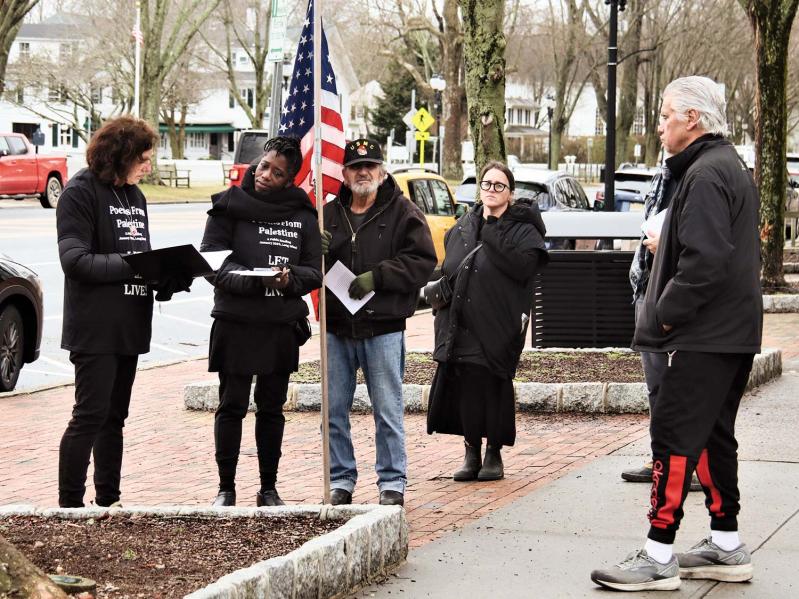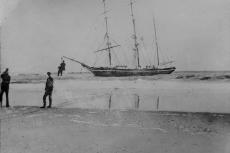The wider world and its sorrows reverberated again in East Hampton Village on Saturday, International Holocaust Remembrance Day, when members of East End for Ceasefire, an activist group calling for an end to the war in Gaza, gave a reading called Poems From Palestine in a cold drizzle on Main Street.
According to the Palestinian Health Ministry, more than 26,600 Palestinians have been killed since the Islamist militant group Hamas invaded southern Israel on Oct. 7, killing some 1,200 Israelis and kidnapping more than 200 others. NBC News has reported that more than 65,000 Palestinians have been injured in that time, and thousands more are missing and presumed dead.
Following Oct. 7, East End for Ceasefire has gathered at Long Wharf in Sag Harbor on Sunday afternoons to call for a cessation of hostilities. A group of counterprotesters has taken to demonstrating alongside them.
Saturday’s action saw peace activists, stationed at regular intervals on Main Street, reading poems by Palestinian poets including Mosab Abu Toha, founder of the now-destroyed Edward Said Library in Gaza.
“Palestine has a rich literary, scholarly, and artistic legacy,” Kathy Engel of East End for Ceasefire said in an email after the reading. “Writers, scholars, educators, and journalists have been targeted and killed in unprecedented numbers during the current siege. Universities, libraries, and other sites of cultural and historic importance have been destroyed.”
The reading on Saturday “was and is in concert with millions of people around the country and the world calling for a permanent and immediate ceasefire in Gaza,” Ms. Engel, a New York University professor and Sagaponack resident, said. “Poetry has always served as a form that opens possibilities for empathy, connection, and transformation. Poetry honors the need to grieve and is historically a form of resistance to war and injustice. In addition, it’s possible that there are those in our communities who have not read the work of or heard the voices of Palestinian people.”
“It is harder to sit with responsibility for, or participation in, destruction when one has heard the voices of those being attacked,” she said.
Some passers-by went about their business, while some others voiced anger at the activists. “That’s so disgusting,” one said. “They’re endorsing terrorists.” Some of the activists engaged with them, explaining that they oppose violence directed against anyone, not just Palestinians.
But the action, Ms. Engel emphasized, was intended for the world beyond East Hampton as well. The group, she said, is in the process of creating content to be shared more widely, “contributing to the global call for ceasefire. Not least, we hope that what we do is heard by Palestinian people as a form of solidarity.”
International Holocaust Remembrance Day falls on the anniversary of the liberation of the Auschwitz-Birkenau complex of concentration and death camps in Poland. The United Nations General Assembly designated the day in 2005 as “a time to remember the six million Jewish victims of the Holocaust and the millions of other victims of Nazi persecution,” according to the United States Holocaust Memorial Museum in Washington, D.C.
“Along with Jewish Voice for Peace, Rabbis for Ceasefire, and so many others around the world, including Holocaust survivors and Israeli peace activists, we believe that calling for ceasefire and demanding an end to a genocidal war is the most honoring form of remembrance,” Ms. Engel said of holding Poems From Palestine on International Holocaust Remembrance Day. “We continue to reiterate ‘never again’ for anyone. Never again is now.”




